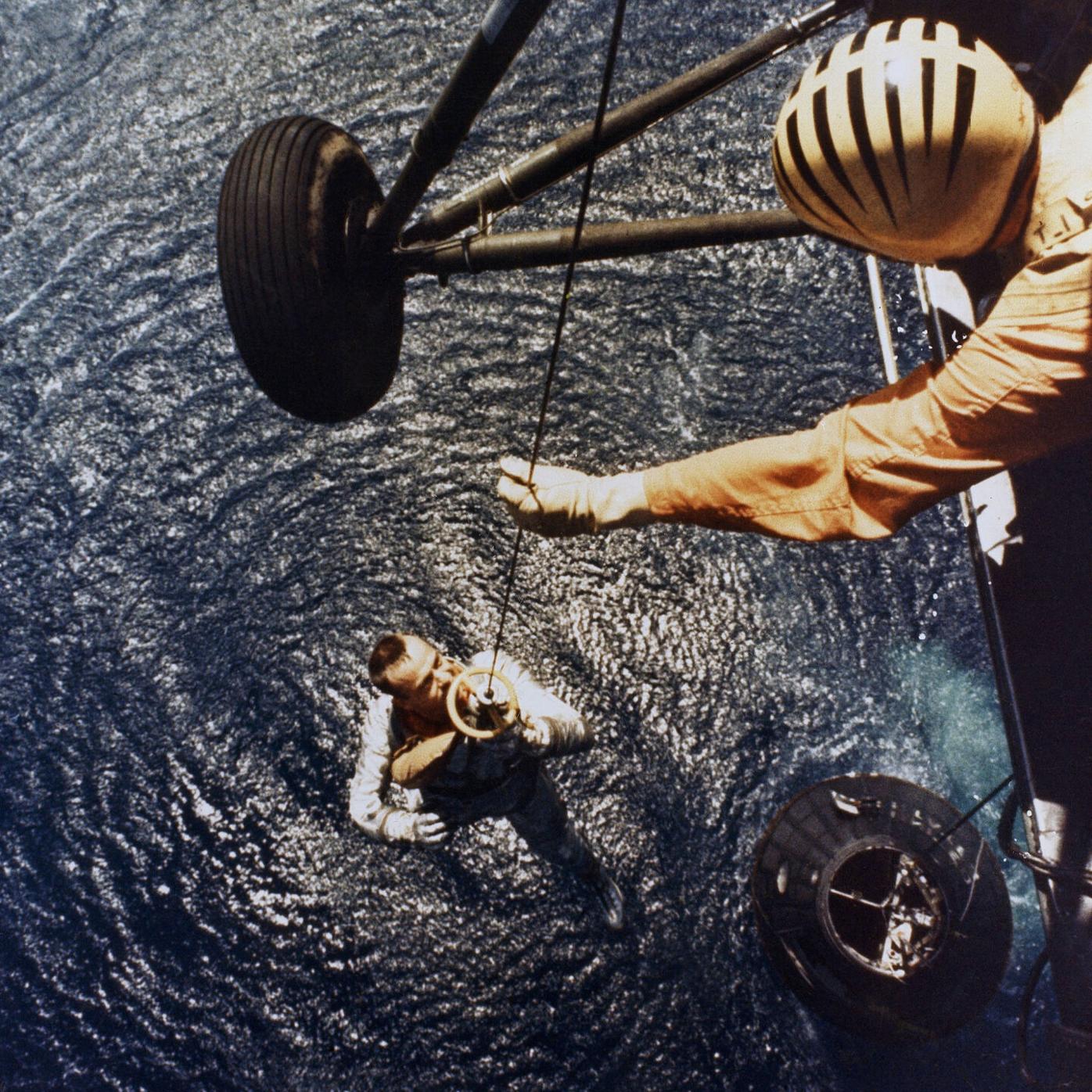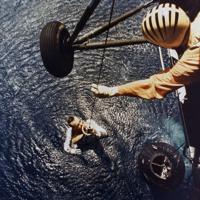Americans are good at democratizing things. Space is next. | Vince Bzdek
V2FsbHkgRnVuaywgcmlnaHQsIGRlc2NyaWJlcyB0aGVpciBmbGlnaHQgZXhwZXJpZW5jZSBhcyBNYXJrIEJlem9zLCBsZWZ0LCBhbmQgSmVmZiBCZXpvcywgbGVmdCBjZW50ZXIsIGZvdW5kZXIgb2YgQW1hem9uIGFuZCBzcGFjZSB0b3VyaXNtIGNvbXBhbnkgQmx1ZSBPcmlnaW4sIGFwcGxhdWQgZnJvbSB0aGUgc3BhY2Vwb3J0IFR1ZXNkYXkgbmVhciBWYW4gSG9ybiwgVGV4YXMu
VGhlIEFzc29jaWF0ZWQgUHJlc3M=
Sixty years and two months after Alan Shepard became the first American to reach space, Richard Branson, Jeff Bezos and their guests became the first private passengers to reach space aboard private rocket ships, and Bezos’s rocket just happened to be dubbed the New Shepard.
The touchdowns of Bezos’s rocket last week and Shepard’s six decades ago are a wonderful study in contrasts.

Astronaut Alan Shepard is retrieved by a Marine helicopter in May 1961 after splashdown in the Atlantic Ocean at the end of his suborbital flight .
courtesy of NASA

Astronaut Alan Shepard is retrieved by a Marine helicopter in May 1961 after splashdown in the Atlantic Ocean at the end of his suborbital flight
.
When the Freedom 7 splashed down in the Atlantic with Shepard aboard, an aircraft carrier, the U.S.S. Lake Champlain, and two helicopters and a team of Navy frogmen recovered the capsule with the world watching on major network television.
When New Shepard alighted on a dusty south Texas desert, a couple pickup trucks rolled up to retrieve Bezos, the richest man on Earth, his brother, and two others — the oldest person and the youngest person ever in space. YouTube, Instagram, Twitter and the Internet quickly streamed the news to the world this time.
That image of those pickups on a lonely Western plain seemed deliberate to me, suggesting along with Bezos’s cowboy hat, that hey, space is no longer the realm of superpower nations and big governments. Pretty soon any yahoo with enough gumption and bucks of his own can go to space.
A reporter I know who was at the launch confirmed for me that this is exactly Bezos’s long-term aim … to open up space to the masses.
“The launch of Blue Origin’s rocket represents another significant step forward for the growing commercial space industry, which is eroding the government’s long-held monopoly on human space travel,” said Christian Davenport, space reporter for The Washington Post, which also happens to be owned by Bezos.
“Like Richard Branson’s Virgin Galactic and SpaceX, Blue Origin’s goal is to democratize space by opening it up to many more people.”
As of last week, the world’s roster of astronauts was about 570 people. Bezos, Branson and Elon Musk and other new commercial-sector space barons hope to expand that into the thousands in the years to come.
I was pretty thrilled to see that the Great American Impulse to Democratize Anything and Everything is very much alive and well — and now reaching for the stars.
This is what we Americans do better than just about anything: make something that was once accessible only to the few accessible to the many.
That impulse took aim at the way kings and queens ruled people first and foremost. We picked apart the whole monarchy thing and spread all the power that used to reside in one person with a palace out among the masses. Took us a while to really reach everyone, including women and people of color. But we’re getting there.
We did it again, the democratizing thing, with education when we built our public school system requiring education for literally everyone, not just the elite. Nobody had done that before.
I’d argue we continued to democratize things like music, moving the world from royal symphonies to garage bands to the point now where anyone with a smartphone and a guitar can make their own music and find an audience online.
The democratization of information via the internet could end up being America’s most profound contribution because that backbone empowers all sorts of other democratizations.
For example, all the pieces of infrastructure that enabled Mark Zuckerberg to launch Facebook in his dorm room were in place already: the Internet, a credit card system for online commerce, a rich supply of developers and tech expertise and an incubating ecosystem of venture capital and investment.
The space barons want to to build the same kind of infrastructure for space business and exploration, Davenport says, enabling many, many more people to take us entrepreneurially into the heavens and the future.
Davenport has observed that these new space barons, with their reusable rockets and relentless drive to bring down the costs of space faring, are trying to build a railroad into space. They have really launched a new Space Age powered by more efficient computing, more affordable launch systems and a proliferation of new technologies that is making space accessible to developing countries, startups, universities and even some high schools.
Some of this gets starry-eyed pretty quickly. Bezos has said his dream is to turn Earth into a national park eventually, zoned residential, so that all our extractive industries are working on other planets.
And the whole space tourism thrust gets criticized as a distraction from more important things, including the need to defend our satellites from attack. Rep. Doug Lamborn (R-Colorado) suggested after the New Shepard flight that Blue Origin needs to focus more on the development of the arch BE-4 engine that will power both its own New Glenn rocket and United Launch Alliance’s Vulcan, which could be important launch vehicles for the U.S government. “Congratulations to @blueorigin on your successful space flight. The future is bright for American space innovation,” tweeted Lamborn. “Now please get back to work on the engines for @ulalaunch’s Vulcan rocket.”
And Davenport points out that democratization still has a long way to go.
Space for now “remains a frontier that only the super wealthy can afford,” he said.
But the game is afoot and America’s next great contribution to a more democratic planet … and possibly a more democratic universe now … is undeniable.
“The United States is the first country to have private companies taking private passengers to space. This is a moment of American exceptionalism. That’s how we see it,” White House press secretary Jen Psaki said at a July 20 briefing. “It will be the ingenuity of all of our commercial partners to help us continue advancing to the next stage of our nation’s space exploration.”
I’m guessing if he were still with us, Alan Shepard would be on board with that.





